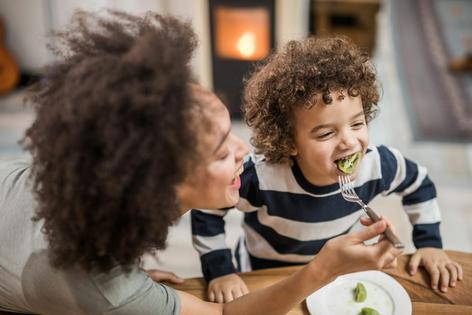Helping children eat healthier foods may begin with getting parents to do the same, research suggests
Published in Health & Fitness
Most parents, educators and policymakers agree that children should eat healthy foods. However, our peer-reviewed paper suggests the strategy adults often use to achieve that can sometimes backfire. Fortunately, there’s an easy fix.
We, along with fellow marketing scholars Lingrui Zhou and Gavan Fitzsimons, conducted five experiments with over 3,800 parents as well as 10 in-depth interviews. We found that parents tend to choose unhealthy foods for themselves after choosing a healthy meal for their young children. This happens because parents said they are uncertain whether their child will eat their healthy dishes, and so they use their own meal as backup to share to ensure that their child at least eats something.
This dynamic is not ideal. For one, it could result in parents eating unhealthier foods, and children may also end up eating unhealthily if they eat mostly from their parent’s plate. Additionally, it does not set a good example of healthy eating.
How, then, to change this dynamic?
After testing several interventions, one stood out as particularly simple and effective: nudging parents to think of their meals as their own, rather than backup options for their kids.
We partnered with a nursery school that was interested in promoting healthier eating among children. Parents associated with the school were offered a free family dinner. Parents first chose a meal for their child from a healthy kid’s menu. They then chose a meal for themselves from a menu that had a mix of healthy and unhealthy options. Half of the parents – randomly assigned – saw a menu that prompted them to think of their own meal as “for you and only you!” The other half did not see this additional prompt to think of their own meal as only for them.
This intervention was successful: By encouraging parents to think of their meal as their own, it made about a third more likely to choose the healthy option for themselves.
Our findings suggest policymakers and schools may want to consider the role parents – and their food choices – play in efforts to encourage healthy eating among children. As for parents, we suggest nixing the backup plan and making sure both they and their children are eating nutritiously.
This article is republished from The Conversation, a nonprofit, independent news organization bringing you facts and analysis to help you make sense of our complex world.
Read more:
Will holding the cheese and chocolate milk on Happy Meals make a difference?
Restaurants pledged to make kids’ meals healthier – but the data show not much has changed
Kelley Gullo Wight receives funding from the Duke-Ipsos Research Center & Think Tank.
Peggy Liu receives funding from the Duke-Ipsos Research Center & Think Tank.








Comments